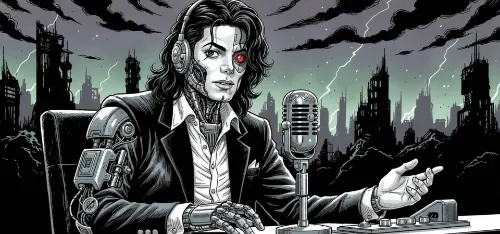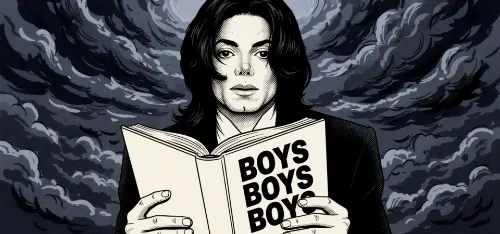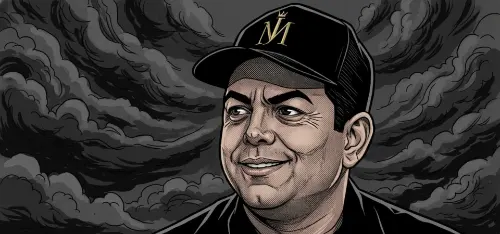Charles Thomson’s Double Standards on Racist Slurs

Apr 6, 2020
Charles Thomson, a little-known journalist with what some might describe as a hint of a Napoleon complex, is widely recognised for his strong support of Michael Jackson. Over the years, he has repeated several contested claims in support of the late pop star. These include promoting Mary Fisher’s widely disputed story that Jordan Chandler was drugged with Sodium Amytal—a claim he repeated in Square One—as well as asserting, incorrectly, that police found no markings on Jackson's genitalia. Thomson has also suggested that the FBI carried out an in-depth investigation into Jackson, another claim that has been scrutinised and challenged.
Yet while Thomson is eager to challenge any accusation against Jackson, his response to racist and misogynistic language used against Jackson critics tells a different story.
The Oprah Winfrey Incident
Twitter user @BillsTVTalk drew attention to a now-banned account, @AngeloMelas (alias “Fyre C Melas”), who verbally attacked Oprah Winfrey over her support for Leaving Neverland, calling her a “coon”—a well-established racial slur. The tweet read:
Fuck her. She's a coon doing the white man's work. I hate this bitch.
Despite being a British citizen—where the term "coon" is undeniably racist—Charles Thomson refused to outright condemn the tweet. Instead, he wrote:
That tweet has two different meanings, depending on the race of the individual who posted it. I do not know Fyre’s race so I cannot comment on the appropriateness of the tweet.
When confronted, @BillsTVTalk asked:
So you're now defending someone using that word to describe Oprah Winfrey? Are you serious?
Thomson replied:
Within the African American community, that word does not mean the same thing it as within the white community. From a white person, it’s a racial slur. From an African American, it’s a synonym for ‘Uncle Tom’. I wouldn’t presume to lecture an African American on race & language.
He added:
I have no idea whether Fyre is black and therefore have no idea of the context/meaning of her tweet.
@BillsTVTalk pushed back:
Fyre isn't black. And besides the racial slur, I think the rest of the tweet is equally as reprehensible. Or do you need context for that too?
But Thomson replied:
How do you know whether or not she is black? She says she is.
Thomson even posted a screenshot showing @AngeloMelas claiming to be Black—taking the claim at face value.
@BillsTVTalk responded:
He said it, it must be true right? Funny that you'll believe him and not a victim of sexual abuse. Very telling.
These exchanges highlighted two major issues: first, that Thomson never condemned a tweet containing not only a racial slur but also violent and misogynistic language; and second, that he seemed all too willing to accept Fyre’s racial self-identification as justification, despite his usual insistence that claims from Jackson’s accusers should not be automatically believed.
Why the Context Argument Falls Apart
Thomson’s argument—that the racial identity of the person using the slur determines whether it’s offensive—is deeply flawed. Regardless of who uses it or where they’re from, "coon" is a word steeped in racism. In this case, Fyre C Melas was clearly acting maliciously, launching a targeted attack on Oprah because of her support for Jackson’s accusers. Their language was not only aggressive and vile—it also led to their account being permanently suspended.
Had Thomson spent just a few minutes reviewing the account, he might have seen this for himself. But he didn’t—possibly because, in some corners of the Jackson fanbase, loyalty appears to matter more than objectivity or decency.
Thomson’s Own Inconsistency: The “Jacko” Debate
Thomson’s refusal to condemn an obvious racial slur stands in sharp contrast to his own earlier behaviour. In fact, he has accused people—including myself—of being racist for simply using the word "Jacko" to refer to Michael Jackson.
One Twitter user, @benjiblight, shared their experience:
So tonight because I referred to the bloke that touches kids as Jacko I was branded a racist thug by a set of Jackson groupies. What's better is all 6 of them have now blocked me. This country is getting worse. People getting offended by the word #Jacko.
Thomson replied:
Jacko' is an old East End racist slur, shortened from 'Jacko Macaco', the name of a monkey people use to pay to watch fight. The monkey's name was appropriated into the East End vernacular as pejorative slang for a black person. So yes, it is as racist as you are thick.
View original tweets here.
This refers to Jacco Macacco, a fighting monkey exhibited in dog-pits in London during the 1820s. According to some historical sources, his name became part of East End slang. Thomson has used this obscure and debatable origin story to argue that calling Jackson "Jacko" is inherently racist.
However, in modern-day usage—especially in the UK and Australia—"Jacko" is simply a common nickname for people named Jack or with the surname Jackson. Dictionaries even note this usage.
Jacko Definition
A nickname for a person whose name is Jack, whose surname is Jackson, or similar.
Channel 5’s Police Interceptors regularly uses "Jacko" as a nickname for one of its officers, whose surname is Jackson. There’s no racial undertone in those cases—just everyday informal speech.
And let’s be honest: the chances of the police or a major TV network repeatedly using a genuinely racist term on national television without consequences are virtually nil.
So, to sum up:
Charles Thomson declined to condemn someone who called Oprah a “coon” and also said “I hate this bitch” and “fuck her”—remarks that led to the user being banned. Yet he accused others of racism for saying “Jacko,” a widely accepted nickname with no racial intent today.
The biggest contradiction, however, lies in this: Thomson accepted an anonymous account’s claim of racial identity to justify a slur, while insisting for years that we should not take at face value the testimonies of those who have accused Michael Jackson.
Once again, this shows that Charles Thomson’s defence of Jackson isn’t rooted in moral integrity or logic—it stems from an obsessive form of celebrity worship and the belief that Jackson should always be revered, no matter what.





